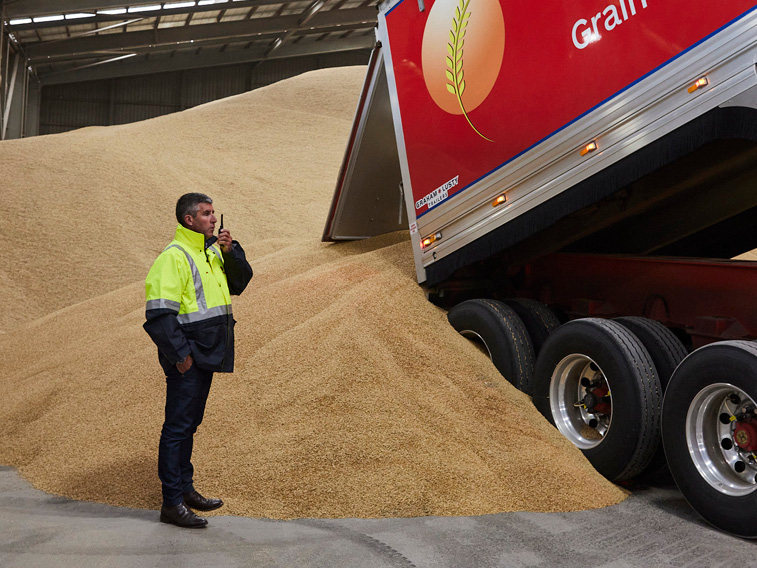The latest NAB Regional & Agribusiness webinar provides insights on the Australian & Global Economies, and a regional and rural property update. Watch the webinar here.


As the grains logistics industry changed, forward-thinking Jim Riordan evolved his business to stay ahead.

When Jim Riordan started his grain handling business in 1996, he didn’t have much in the way of assets.
“I started with just one truck,” he recalls.
But a long-term perspective and a willingness to innovate have taken him further than most. In 2021, Riordan Grain Services celebrated its quarter-century by notching up the first million tonnes of grain exported under an innovative bulk carrier model.
In that time, the family owned and operated company has expanded its trucking and trading business to an integrated operation that extends from farm gate to loading bulk vessels, across Victoria and New South Wales. And from that single tipper truck, Jim has grown his fleet and subcontractor base to over 100 vehicles.
In those single-truck days the industry was very different. The Australian Wheat Board had a monopoly on exports, and a single-buyer market meant the sector had become stagnant.
Then came deregulation and a rapid evolution.
“We needed to be something different,” Jim says. “We had to find customers who were looking for different services. So we had to innovate our whole business, from electronics to GPS in trucks. In 2001, when text messaging services first became available, we were one of the first customers.
“When the market fully deregulated in 2012 and 13, we needed to find new ways to run our supply lines to our customers. So we’ve had to continually evolve ourselves through innovation to survive.”
With deregulation, competition for access to port loading facilities has greatly increased. One of Riordan’s major evolutions in recent years has been the introduction of mobile bulk loading, a method of transferring grain directly from trucks to bulk carrier ships, bypassing the need to use port loading assets.
“The move to innovate into bulk export was purely driven by the marketplace and the customers,” Jim explains. “Our customers were looking to buy grain from us, but we were unable to access those delivery lines.
“So we needed to think outside the square and think how we were going to be able to deliver this grain onto ships and create our own logistical supply lines to these customers.”
Michelle Kerr, Riordan Grain Services employee, says the company’s model is a much trickier proposition that more traditional methods, which rely on storing grain dockside ahead of the vessel’s arrival.
In Riordan’s case, stocks of grain and trucks need to be coordinated in a precise dance, to match the ship’s schedule.
“There’s a lot of moving parts,” Michelle explains. “Because we’re loading it in a live situation and we’re not pre-accumulating into storage at the port, it is a large logistical task. We’re in a situation where we have to be ready to fire from multiple origins well in advance of a vessel arriving, because once it’s here, the clock’s ticking.”
While the introduction of the new loading method came out of necessity, it brought a host of benefits. Riordan’s is finding it a much more flexible and efficient system that can provide purer grades of grain more targeted to customers’ needs.
It’s also helped the company further develop and deepen relationships with the farmers who supply it.
“Growers love being part of the supply chain,” Michelle says. “It doesn’t end at the farm gate anymore for them. They’re driving their own grain down to our system at Geelong or Portland, delivering it with their own truck and tipping it into a hopper themselves directly onto a vessel.
“They really take pride in what they produce and what they want to sell back into the market, and this allows them to be a part of that sales and export experience.”
Jim agrees, saying the new model has relied on the strength of those relationships with growers, bankers like NAB, and other partners in Riordan’s success story.
“We couldn’t have achieved something like loading bulk vessels if we didn’t have people like NAB, and other suppliers – whether its finance or grain or anything.
“NAB was integral to the expansion of our services to our customers. Without their support, we wouldn’t have been able to service those customers.”
Although the market is now fully deregulated, Riordan’s is not resting on its laurels. A changing climate and increased consumer demand for supply chain visibility are among the factors set to further shake up the industry.
Michelle is keeping an eye on these trends, with a view to turning challenges into opportunities.
“It doesn’t take long for a competitor to catch up into your market space,” she says. “You always have to be forward thinking: what’s the next opportunity? What does the customer demand? What’s happening globally?”
Jim agrees, saying that a future focus is core to Riordan’s culture.
“It’s important to be forward-thinking in a business as dynamic as ours,” he says. “If you don’t, you won’t achieve the goals we’ve set out to do.
“It’s what sets us apart from anyone else.”
© National Australia Bank Limited. ABN 12 004 044 937 AFSL and Australian Credit Licence 230686.